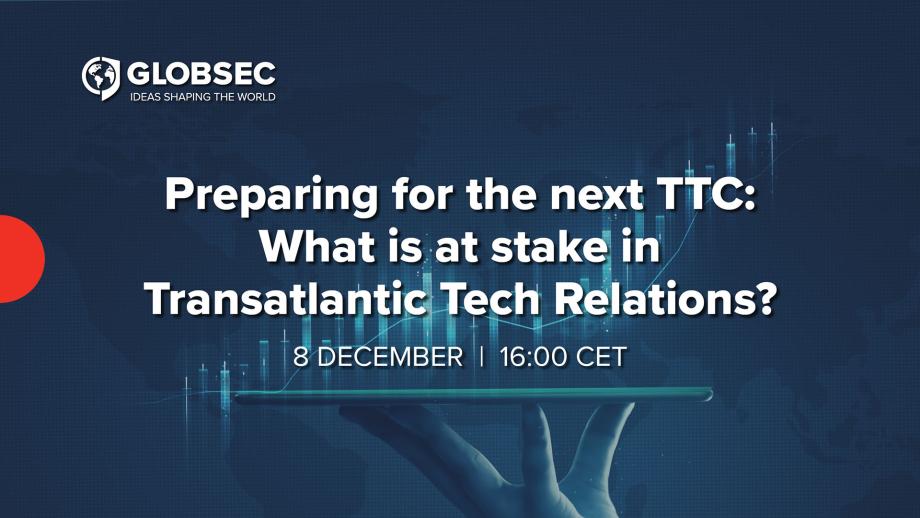08.12.2021 - Preparing for the next TTC: what is at stake in Transatlantic Tech Relations?

Wednesday, 8 December
4:00 PM – 5:00 PM CET
Virtual webinar, registration link here
GLOBSEC supported by Google is delighted to organize a debate in preparation for the upcoming Trade and Technology Council.
GLOBSEC believes cooperation between the US and EU in digital legislation is crucial from a strategic as well as from an economic point of view. Strategically, the digital domain has multiple implications for global power relations. Economically, the transatlantic trade and investment space are the largest in the world. But Transatlantic partnership and cooperation in the digital domain has seen challenges over the years as a difference can be identified in the policy positions of both blocks. The United States views data transfers through a national security lens in strategic competition with authoritarian powers, whereas the EU focuses more on fundamental rights. As the policy positions of the EU and the US do not yet align, two problems among others can be identified as a consequence. First, the two parties are missing out on economic growth from digital trade and depriving consumers on both sides of the Atlantic of better digital services; and second, as the digital economy becomes more sophisticated and mainstream (with technologies such as cloud computing, artificial intelligence, distributed ledger technologies, widespread 5G connections and the internet of things), the two sides are leaving a vacuum for others (i.e. autocracies) to establish digital trade rules.
Speakers:
- Andreas Schwab, Member of the European Parliament (EPP) and DMA rapporteur. Mr. Schwab is a member of the European Parliament since 2004. As coordinator of the EPP-group in the influential Internal Market Committee (IMCO) of the European Parliament Mr. Schwab has been successfully steering key legislation through parliament like the Consumer Rights Directive (2011), Network and Information Security Directive (2013), the Directive on Antitrust Damages Actions (2014) and the Directive on the European Competition Network (2018). He has been authoring important resolutions of the European Parliament on "Single Market Governance" (2012) and on supporting consumer rights in the digital single market (2014).
- Alina Polyakova, CEO, Center for European Policy Analysis, Washington. Dr. Polyakova is a recognized expert on transatlantic relations with over a decade of leadership experience and deep expertise in European politics, Russian foreign policy, and digital technologies. Before joining CEPA, she was the Founding Director for Global Democracy and Emerging Technology at the Brookings Institution. Previously, she served as Director of Research for Europe and Eurasia at the Atlantic Council, where she developed and led the institute’s work on disinformation and Russia.
- Christoph Riedmann, Policy Advisor for Digital Policy, EUROCHAMBRES. Mr. Riedmann has been Policy Advisor for Digital Policy at EUROCHAMBRES since 2018. Besides lobbying for European SMEs on legislative projects in the digital field, such as the Fairness-Business-Regulation, the DMA or e-ID proposal, he has encouraged Chambers of Commerce and Industry from across Europe to digitize their service offers for companies and exchange their best practices. After completing his studies of law and languages in Innsbruck, Christoph worked for the Austrian Federal Economic Chamber WKÖ, the Austrian Permanent Representation to the EU, the European Commission, and the European Association of Technology Industries ORGALIM.
- Hanno Woelm, Policy Director, European Round Table. Mr. Woelm has been responsible for trade and digital policy at ERT since 2017. Previously, he was Policy Director at the Trans-Atlantic Business Council (TABC) and a public affairs consultant at APCO Worldwide in Brussels. Before his career in Brussels, Mr. Woelm briefly worked at the Delegation of the EU to the US in Washington, D.C. He holds degrees in European politics from the University of Osnabrück, Germany, and the London School of Economics and Political Science (LSE), UK.
Moderator:
- Roland Freudenstein, Vice-President of GLOBSEC and Head of GLOBSEC Brussels
Agenda:
4:00 PM - Welcome and moderation by Roland Freudenstein, Vice-President of GLOBSEC and Head of office, GLOBSEC Brussels
4:05 PM - Moderated discussion with 3 speakers
4:35 PM - Q&A with the audience
4:55 PM - Summary and closure (5 minutes)
#GLOBSECwebinars